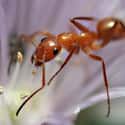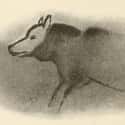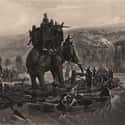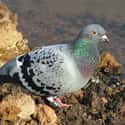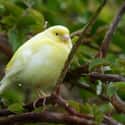-
(#1) Cats Keep Bodegas Pest Free
Do you know how much an exterminator costs in a major city? One things for sure – a cat is a whole lot cheaper despite the health code violation. While cats are domesticated, they still have a natural urge to hunt, which makes them great for stores. They love being around people because we feed them, and in exchange, we sometimes get their love. Bodega owners in cities across America have long adopted cats in order to eradicate mice and other small vermin from their shops. Little do they know they're basically employees of the bodegas themselves.
-
(#2) Ants Stitched Up Open Wounds
Back before people went to doctors to stitch up gnarly wounds, ancient tribes in East Africa and South America used living ants as sutures. Dorylus or Eciton ants were commonly tricked into stitching up warriors because of their sharp, unyielding bite. To trick an ant into becoming your Band-Aid, all you've got to do is hold together your wound, get it to bite you, and then snap off the rest of the body once it's attached. The only drawback is that ants aren't sterile, so you better watch that incoming infection.
-
(#3) Dogs Helped Create Human Heart Surgery
In the early 19th century, there wasn't much you could do about heart disease – at least until dogs so kindly laid down their lives for their human friends. Around the turn of the century, surgeons began researching how to repair a heart in a living patient by operating on dogs. Their main goal was to learn how to repair heart valves in a living subject since rheumatic fever and other heart-stopping illnesses were running rampant. By 1923, the first successful heart surgery was performed on a 12-year-old girl in a coma who lived four years until she eventually died of pneumonia. This is all thanks to man's best friend.
-
(#4) Birds Helped Develop Modern, High-Speed Trains
Travelers owe a lot more than they think to birds, which unknowingly helped shape one of the fastest trains on the planet. In 1964, the Japanese Shinkansen Bullet Train shot off on its first ever 120 mph journey. The only issue was that the speed of the train caused a loud boom when it exited tunnels, and passengers felt like the train was squeezing together – a totally weird and really unpleasant feeling.
Engineer and bird lover, Eiji Nakatsu, took on the task of figuring out what exactly was going wrong, and he discovered the train was pushing air in front of it, which would crash against the air outside of the tunnel and put a massive amount of pressure on the train. Nakatsu realized he needed the train to sharply cut through tunnels, so he drew inspiration from the kingfisher. Kingfishers effortlessly plunge in and out of water without even really making a ripple. Nakatsu ended up changing the shape of the front of the bullet train to look nearly identical to a kingfisher's bill. This model not only eliminated the problem, but it was 10% faster and 15% more fuel efficient.
-
(#5) Humans Thrived Because They Had Dogs To Help Them With Chores
There's a reason modern-day humans thrived and Neanderthals did not. While a number of factors cotributed to their detriment – like environmental changes and technological advancements – some suggest that humans' utilization of canines helped them outlive their less-skilled counterparts. Anthropologist Pat Shipman believes the domestication of dogs is the root of human survival. In exchange for shelter, food and a few furry cuddles, humans tricked Paleolithic dogs (gigantic pups who weighed a minimum of 70 lbs) to transport animal carcasses during hunting. Without having to shoulder the weight of carrying a bunch of heavy animal carcasses, humans could spend more time hunting, gathering, and getting down (i.e. procreating for our species' future success).
-
(#6) Dead Animals Were Used As Chemical Warfare
Animals can't even get a break once their dead. People used to use dead animals as chemical warfare. Persians, Greeks, and Romans from 300 BCE used to throw dead animals down wells to contaminate drinking water and poison unwitting enemies. This method, along with using poisonous roots like mandrake (a sedative) and hellbore, is some of the first ever documented chemical warfare.
-
(#7) Elephants Were Drafted Into Armies
Okay, so they weren't actually drafted, but they certainly participated. In India, China and Persia, elephants were tricked into being literal agents of war. These unwitting soldiers were first used by Alexander the Great when warring against King Porus in 326 BCE. The reason elephnts were so easily tricked into slaughtering opposing sides is because male elephants are hyper-aggressive, especially around mating season. Provoke them and they will trample you with their sheer size. Elephants are also fiercely protective. Once an elephant forms such a strong bond with their trainer, they'll charge at great speeds to protect them.
-
(#8) Baboons Led Thirsty Humans To Water
It's hard finding water in the desert, but baboons can always lead you to a reliable source. Bushmen in Africa know this, and in both modern and ancient times, trick the monkeys into helping them find a freshwater source. All you have to do is give them with some salt: set up a trap to catch a baboon, put some super salty snacks around, and wait for the baboon to bite. Once it's eaten your super salty snack, let the baboon go, and follow it to water.
-
(#9) Pigeons Act As Mailmen
Before the modern mail system (and long, long before email), people used carrier pigeons to deliver important messages. Homing pigeons were selectively bred for the ability to find home from extremely long distances, so messages can only be sent in one direction. Ancient Romans famously used the pigeons during chariot races to tell owners how their bets had placed. Genghis Khan also established pigeon relay posts across Asia and Eastern Europe to deliver messages back to his armies.
-
(#10) Cormorant Birds Help Fisherman Catch Fish
Cormorant fishing is a traditional practice in Japan and China, where owners train birds to fish in rivers and streams. In order to catch fish, fishermen tie a snare at the base of the bird's throat which prevents them from swallowing larger catches. These birds are trained to return to their boats after they catch a fish. When they return, they're made to spit up their catch.
Cormorants are super smart and are said to keep a tally of what they catch (they allegedly can count up to seven). If they're not rewarded for their efforts, they simply stop fishing. At least these little guys get some form of payment for their hard work, even if they've got to demand it.
-
(#11) Canaries Let Miners Know There's A Problem
Dating back to 1911, canaries have been used in coal mines to detect carbon monoxide before it has a chance to hurt humans. Canaries were beloved in the mines they worked in, and treated like pets among the many miners. Even so, the birds were released into the mines, and if they stopped singing, miners knew there was a porblem. Canaries are particularly vulnerable to airborne poisons, so when a canary died, it was a warning for miners to get out as fast as they could before they started feeling the effects of toxic gas. The rather inhumane practice ended in 1986, when canaries were replaced with electric CO2 detectors.
New Random Displays Display All By Ranking
About This Tool
Humans and animals have a history of getting along for more than 6 million years. When ancient people faced other animals that living on earth, they mainly relied on hunting and fishing to obtain them as food. In the long-term process of evolution, people learned how to tame and raise animals, which fundamentally changed the coexistence relationship between humans and certain animals.
With the advancement of history, the importance of many animals to humans is constantly changing. Here the random tool introduced 11 great animals that are helpful throughout history, including horses, dogs, elephants, pigeons, etc.
Our data comes from Ranker, If you want to participate in the ranking of items displayed on this page, please click here.












